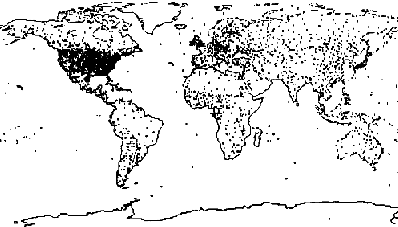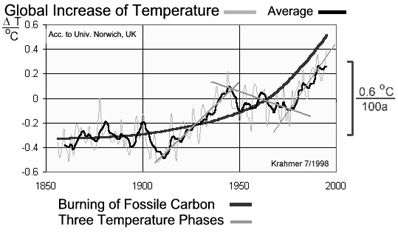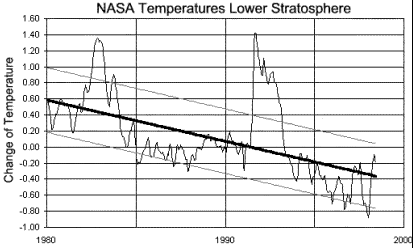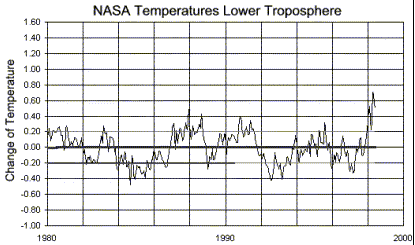Critical Remarks concerning Greenhouse-Revisionism
Science without Ideology?
What some people polemically call the dictatorship of the ecologists, and the ideology that goes with it, seem to be particularly active in Germany. It is thus not surprising that quite a few personalities of public life are turning against the putrid exaggerations of this philosophy. Any kind of political fanaticism calls for a fundamental critique, and so this countercurrent effort is in our opinion a good thing.
For many years now, Wolfgang Thüne, at one time one of the most popular meteorologists of the German TV-channel ZDF, has been indefatigable in his private war against many of his professional colleagues. He is certainly right in his massive criticism of the hysteria that has sprouted around carbon dioxide, this gas which is not only fundamentally harmless but, moreover, essential for our existence. Germany in particular, with its high population density and its basic lack of natural resources, is vitally dependent upon its industry. Unfortunately, over the last four decades, this industry has increasingly come under attack from various sides, covered with abuse, and indeed been met with truly irrational hate. It is, therefore, entirely justified to suspect political motives behind the hysteria surrounding carbon dioxide and the greenhouse effect. This is not to mean, however, that the arguments which support the thesis of the greenhouse effect are, in themselves, erroneous.

Density of permanent temperature probes on the surface of the earth in 2000. Most probes are located in densely populated and highly industrialized areas where heat generation from human activity increases ambient temperature considerably.[1]

An average increase of 0.6 °C over 100 years in the temperature of the air, detected by a non-representative network. A sound reason for hectic activity?[2]
On the other hand, skepticism regarding Dr. Thüne is not without justification, considering the fact that this man did not obtain his doctorate in the field of meteorology, but rather in political science, with a thesis on a person's love for his native area (Heimat)-a topic frowned upon today as being overly conservative, if not uncomfortably far right. I fondly remember how Thüne, in his ZDF weather forecasts, had the highs and the lows hover over East Prussia, Pomerania and Silesia, although what pleased me, a child of a father ethnically cleansed from Silesia, may well have irked others. Today, Dr. Thüne is vice-president of the Association East-Prussia to which I once indirectly belonged as a member of a student fraternity with roots in Königsberg, the former capital of East Prussia, and in whose youth organization I was briefly active in the nineteen-eighties.[3]
It is no secret that relations between the German refugee organizations with their patriotic-conservative or national orientation, and the Greens, rooted as they are in anarchistic tendencies of the radical left, are somewhat strained, to put it mildly. We can therefore assume with some justification that Dr. Thüne, too, did not approach in a completely non-political way this favorite subject of green propaganda when launching his frontal assault against it. It is thus more than just a little surprising to note that Dr. Thüne has been awarded the Woitschach prize for ideology-free science, in the light of the fact that Dr. Thüne's books and other texts are far from being devoid of any polemics, political and otherwise. While he may be quite right in his criticism of the political exploitation of ecological problems, his own science is no longer free from ideology as soon as he himself enters the political arena.
I do not write this to distance myself from Dr. Thüne's political views-quite the contrary. From his publications and a brief correspondence with him I perceive many similarities in our views. However, I do not indulge in the belief that my own scientific work in a field that is a hotbed of ideologies is at all times totally independent of my own views of the world. It is true, of course, that a scientist, in his search for the truth and in the presentation of his discoveries, must strive to shed any influence of ideology. Moreover, any scientist working in a field that has any political relevance should declare his political convictions for others to be able to judge the conscious or subconscious premises he may start out from. To believe, however, or to demand that a scientist be in a position to attain without fail the golden goal of absolute objectivity is, for all intents and purposes, an illusion. Man, as a zoon politikon, is not able to comply with such a request.
Such a skeptical judgment need not even be regarded as a negative one, for are we not all placed between the opposing forces of, on the one hand, an aspiration towards objectivity-which can be held against us as being socially and politically callous-and, on the other hand, a social and political engagement aimed at truth and justice-which can be construed as being ideological infatuation. It is always a matter of point of view. The important thing is to maintain the proper balance, to announce one's colors, and not to affirm oneself as the only true and objective hunter for the truth. Such an affirmation of being the sole holder of the truth, in itself, is already a measure of a possible ideologically motivated fanaticism.
Scientific battle-lines
It is generally undisputed that the CO2-content of the earth's atmosphere has gone up by 30% over the last 50 years. To what extent the average temperature of the earth's surface has increased over the same period is, however, much less well established. The problem is primarily that there exists no network of temperature probes spread out evenly, in the statistical sense, over the whole surface of our planet. Something of that nature came into being only since the earth is surveyed completely with weather satellites, which observe and record such data on a global scale, starting in the early eighties. This period of 20 years, however, is a very short time span if statistically valid statements are to be made regarding the average temperature of the earth, or rather of its surface. In view of the possible existence of other factors that might cause an increase in temperature-such as other effects attributable to man, or, last but not least, variations in the activity of the sun-it is debatable why carbon dioxide should be declared the main culprit.

Infrared determination by satellite of the average temperature in the lower stratosphere (8 – 30 km, ozone layer). Significant lowering of the temperature due to ozone depletion, causing a lower conversion of incident uv-light into heat at this altitude.[2]

Infrared determination by satellite of the average temperature of the lower troposphere (near earth's surface). No significant temperature increase.[2]
Things change slightly, though, when you consider Thüne's thesis regarding the radiation balance of the earth. The basis of his theory is the tenet that the atmosphere cannot radiate energy back to earth. To support his claim he uses the Second Law of Thermodynamics which, according to his interpretation, prevents energy from being radiated by the cold atmosphere towards the warm surface of the earth and thus causing a further warming of the latter. Doctor Thüne's use of the Second Law is, however, erroneous-no law in the world can bar a cold body from radiating towards a warmer one and causing a slight warming. The Second Law of Thermodynamics only states that in a closed system the net flow of heat will be from hot bodies to cold ones, with the warm earth thus giving off more heat to the atmosphere and to space than it receives from them in return. It does not mean that nothing comes back to earth.[4] The slight back-flow only retards the net flow of heat.
Fundamentally, the heat balance around our planet is in a dynamic equilibrium in which the radiation received from the sun is equal to the heat loss to space. In this case, the average temperature (the energy content) of the lower atmosphere depends upon the quality of the insulation, i.e., upon the average time it takes a quantum of energy captured to escape back into the universe. For a planet devoid of an atmosphere, such as the moon, there is no insulation, and the energy is almost completely given off during the night. On the other hand, a planet with an extremely dense atmosphere, such as Venus, retains for a rather long period the energy received and thus attains a fairly high temperature.[5]
Thus, it becomes quite evident that the equilibrium temperature of the earth is a function of the composition of the atmosphere. This being the case, CO2 plays however only a minor role among the many other trace gases, such as water vapor, methane, laughing gas, ozone, and chlorofluorocarbons. These gases claim a much greater effect with respect to the heat balance around the earth than does carbon dioxide,[6] because their absorption bands are located in the infrared window of the earth's atmosphere, whereas, as Dr. Thüne correctly noticed, the absorption bands of CO2 (at 2.8 µm, 4.5 µm, and 15 µm) lie outside of this window, with the exception of the 4.5 µm line. It is a little irritating to note Dr. Thüne's rigorous rejection of the possibility that trace gases in the atmosphere can close a radiation window and can radiate energy back. Even though CO2 cannot close the infrared window of the earth's atmosphere, a certain spectral range will still be reduced.[7] This effect on the energy content of the atmosphere may well be overestimated, but it is not zero.[8]
Such an overestimation of the effect of the CO2 content may also be related to the general belief that doubling the CO2 content would also lead to a doubling of the insulation potential. This is not true, though, as the intensity of the absorption approaches logarithmically a limiting value of 100%. Hence, a further increase in the CO2 concentration in the atmosphere will no longer have as strong an effect upon climate as has been the case so far.
Political Debate
All the hurly-burly surrounding the actual or suspected effect of man's contribution to the increase in trace gases obfuscates the real political scandal of the whole debate. It is neither the unwillingness nor the lack of insight of the industrial nations to reduce these emissions. The scandal starts with the question of which energy sources should be used for the generation of energy.
Oil has earned its epithet “black gold” not only because it indeed represents something of a gold mine for certain oil barons, but also because its value for the modern industrial economies can hardly be overstated. Oil has taken over the role that coal played in the early part of the 20th century. What comes to our mind immediately when we think of oil is fuel for our cars and our airplanes or heating oil for our homes. Oil's greatest value, however, comes from being the most important raw material for the chemical and, even more importantly, the pharmaceutical industry for practically all of those chemical products that enable our life to take on the character that we have assigned to it.
Fundamentally, fuels for vehicles or airplanes can be based on other sources. The most promising candidate that comes to mind is hydrogen. With respect to its energy density, it does not quite measure up to the oil-gasoline-kerosene group, but it does have a number of highly convincing advantages:
- a. Hydrogen can be produced from water by electrolysis. The only by-product is oxygen which can be released into the atmosphere.
- b. The electrical energy necessary for electrolysis can be generated by means of solar cells.
- c. Hydrogen can be compressed and liquefied, thus enabling it to be transported via pipelines or large tankers.
- d. The basic requirements for the construction and use of solar cells-sand and sun-are abundantly available in the countries which today are producing oil. We can therefore make use of the existing infrastructure built for this purpose.
- e. When hydrogen is burnt with air, the only exhaust gas produced is water (aside from minor traces of nitrogen oxides).
Models for converting modern industrial societies to the use of hydrogen have been around for some three decades. The technologies are ready; what is missing is the political will and the economic feasibility.
Meanwhile, we keep on burning vast amounts of black gold, a raw material that is almost irreplaceable for chemical and pharmaceutical industries. If the reader had the choice of heating his home either with hydrogen or by burning all the plastic and textile products of his home as well as all medical supplies it contains, what would he decide to do?
This is the true madness of our present state of affairs. By burning oil we burn the basis of the production of modern plastics, of textiles, of medical products, although we have at our disposal a far better source of energy, if we would only decide to exploit it.
You have three guesses as to why this crime of setting on fire the future of our children and our children's children goes on unimpeded. Ask the likes of Dick Cheney and George W. Bush; maybe these oil-barons can give you a clue while taking a break from bombarding to death some recalcitrant human beings in order to keep the oil market under control.
Thus, the fundamental scandal about the greenhouse effect is not the uncritical disposition of the meteorologists of this world, but the power of Big Oil with all its downstream industries.[9]
Basic questions of scientific theory
Even a cursory survey of the internet reveals immediately that the discussion of the greenhouse effect is not a latter-day taboo. One encounters the author Wolfgang Thüne in many of the major German newspapers and magazines. Books on Widerlegte Klimatheorien (Climate Theories refuted)[10] and Umweltmythen (Environmental Myths),[11] written by reputable authors are offered by large publishing houses. Arguments and counter-arguments abound, even in the camps of the experts.[12] It would be far-fetched to compare Thüne's greenhouse revisionism to the revisionism regarding the Holocaust, because a suppression or a ban does not strike Thüne's thesis.
Doctor Thüne is not alone in his critical attitude. Others, some of them much more highly qualified, are joining his ranks. The fact that many of them have some sort of a relationship or may even be financed by emission-intensive industries renders them untrustworthy in the eyes of their opponents.[12] This is of course no argument for casting doubts on the greenhouse revisionists, although it does cause one to wonder as to the nature of a science allegedly free from ideology.
The Holocaust brand of revisionism is not supported by worldly or industrial powers, and its promoters reap only disadvantages from their efforts. Aside from scientific or social altruism, Holocaust revisionists cannot claim any motives that might make their actions comprehensible…
Notes
| [1] | www.zum.de/Faecher/Ch/RP/ozon/temperatur1.html |
| [2] | www.wuerzburg.de/mm-physik/klima3.html |
| [3] | Accordingly, Thüne's contributions can be found in the Ostpreußenblatt, a paper closely associated with the Association East-Prussia, e.g.: “Nein zur Ökodiktatur” (No to the economic dictatorship) Nov. 1, 1997; cf. online http://konservativ.de/umwelt/thuene44.htm |
| [4] | That would be just as absurd as to claim, regarding diffusion (Fick's law), that no particles can diffuse from locations of lower concentration to locations of higher concentration. This is contradicting the diffusion process which is purely statistical, i.e., equal into all directions. Only as a statistical average, more particles diffuse from locations with higher concentrations than from locations with lower concentrations. |
| [5] | According to calculations, the temperature on Venus would be around 100°C without greenhouse effect, but it actually is around 450°C; cf. www.as.ysu.edu/~adhunter/Teaching/Chem500/notes3bw.doc |
| [6] | www.geo.arizona.edu/geo4xx/geos478/GC2002.GHG.html: in comparison to CO2, the following factors apply: methane: 24; laughing gas: 300; chlorofluorocarbons: 5,000-10,000. |
| [7] | As is known in spectroscopy, an increase of concentration leads to a broadening of absorption bands. Due to this effect, an increase of CO2 leads to a slight narrowing of the radiation window. |
| [8] | Compare also the critique by Dipl.-Ing. Peter Dietze, Langensendelbach, http://krahmer.freepage.de/klima/thuene/kritik01.html. |
| [9] | My Master thesis focused on a section of the onboard energy supply system of the once planned European space shuttle Hermes, which has been abandoned in the meantime. The system was planned as an oxygen-hydrogen fuel cell. As such, I got in intensive contact with the hydrogen technology as well as with the power of big corporate industries to suppress this technology. Furthermore, during my chemistry studies, which included spectroscopy, I also studied a few semesters of meteorology just for the sake of it, since I had made weather observations a hobby of mine in my youth. |
| [10] | Nigel Calder, The manic sun. Weather theories confounded, London. Pilkington. 1997 |
| [11] | Dirk Maxeiner, Michael Miersch, Lexikon der Öko-Irrtümer. Fakten statt Umweltmythen, Piper, Munich 2000. |
| [12] | Cf. e.g., www.germanwatch.org/rio/skept.htm. In this, Dr. Thüne is accused of having stubbornly ignored critiques written against him, which is an accusation that I did not check. |
Bibliographic information about this document: The Revisionist 1(2) (2003), pp. 135-138
Other contributors to this document: n/a
Editor’s comments: n/a
